Pests On The Move In The East Of Adelaide
September 27, 2022
August 18, 2021
Table of Contents
Spiders are fearsome pests with fangs capable of injecting venom. You can spot them in certain areas in your home, including the bathroom, basement, and attic or crawl space. While seeing a spider in your house is enough to send chills down your spine, it is good to know that not all spiders are poisonous. They may even help eliminate pests like flies, cockroaches, and mosquitoes. However, it is also worth noting that others are venomous. And here is sufficient information about poisonous household spiders you need to avoid.
Black widow spiders are commonly associated with agricultural areas and urban habitats. Females have a bright red mark on their undersides. The red mark is in the form of a dot or an hourglass. Males are shyer, smaller, and less poisonous than females. They are also thin and grey or mottled brown. You will readily find black widows in places with:
Two red marks characterise a bite from a black widow. When venom is injected into your body through the bite, you will experience nausea, fever, muscle spasms, or cramps. Once you get bitten, stay calm and apply direct heat to the bite site to relieve pain and prevent the venom from spreading. Then, seek medical help immediately from an experienced doctor.
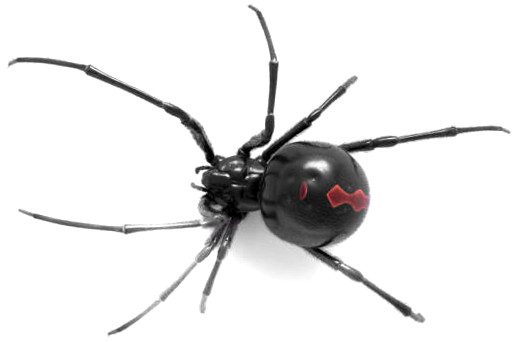
The brown recluse spider has a smoother appearance than other similar species. It can be challenging to spot this spider due to its dull colour but you can differentiate it from other house spiders by the classic violin mark on the back. Its abdomen does not have any markings, and the legs have no thick hairs. Such spiders prefer inhabiting warm, dark, quiet places. Since they like hiding, it is easy for them to bite without notice.
Brown recluse bites are characterised by red, itchy skin. The bitten area then turns into a blister before worsening and becoming an open sore with tiny red dots. You may also experience nausea and fever. Toxins from the bite may lead to tissue death or necrosis that can take a long time to heal.
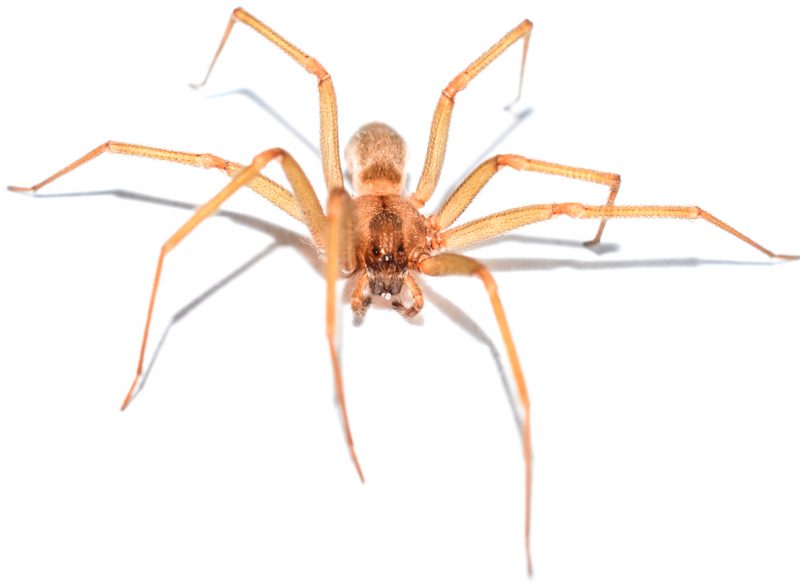
Hobo spiders are responsible for most spider bites. They have eight eyes and distinctive hairy legs. You can also easily identify them by their mottled colouration and distinctive Herrington pattern. Their common spider bite is painful and can lead to localised red swelling, nausea, fever, and tissue death. Immediate medication is required to ease the symptoms.
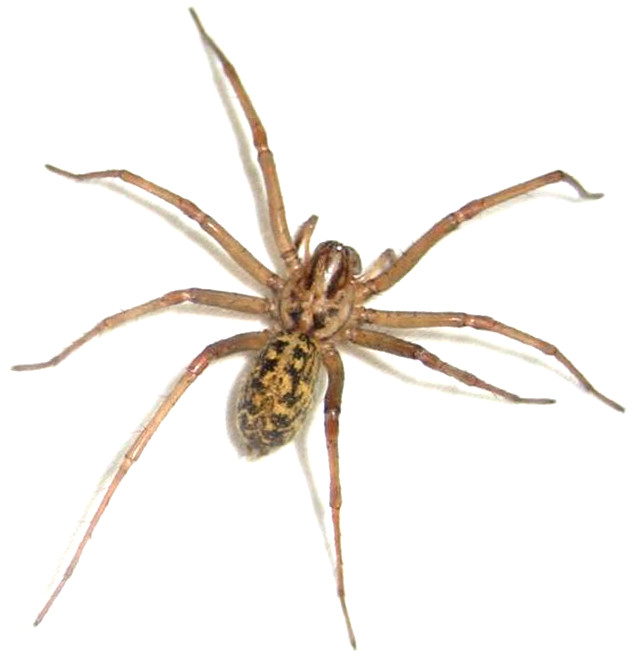
The yellow sac spider builds a den-like structure from silk. It hides during the day and comes out at night to hunt. As their name suggests, yellow sac spiders feature a yellowish or pale beige pigment. Their body is V-shaped, making them easy to distinguish from other types of spiders. You will likely see them at wall tops in the bedroom, living room, and kitchen.
Yellow sac spiders bite when rattled. A bite from this spider results in a tiny red welt with a mild necrotic centre. Bites also trigger symptoms like nausea, fever, headache, and dizziness. In severe cases, a bite can cause anaphylactic shock.
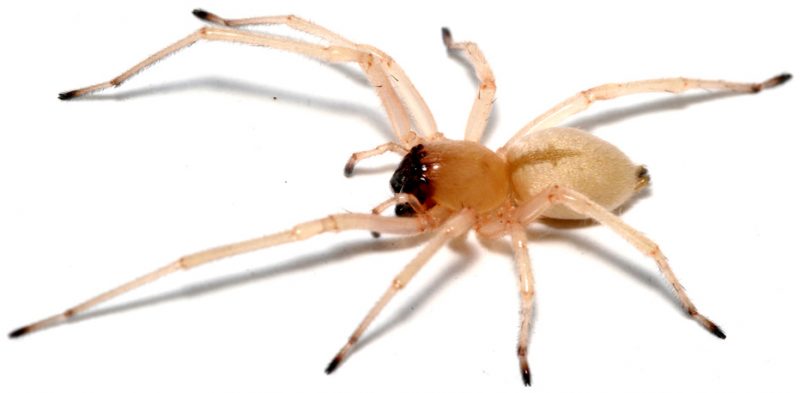
A red house spider is reddish-brown over its entire body, including the legs. The spider grows as long as 0.2 to 0.3 inches, with adult females being bigger than males. Red house spiders have a spotted body and a rounded stomach shaped like a globe, with females having a red band under the stomach. The red and brown spider accesses your house through holes or cracks before moving to cool and dark spots to nest. You will find its web in the dark corners of your house.
Red house spiders are not aggressive but usually bite when you disturb their web. So, you need to take great care as you clean out spider webs. Their bite is painful but not fatal, nor does it cause a lesion or death of skin cells. You can identify their infestation through remnants of insect prey, eggs sacs, or seeing one of them.
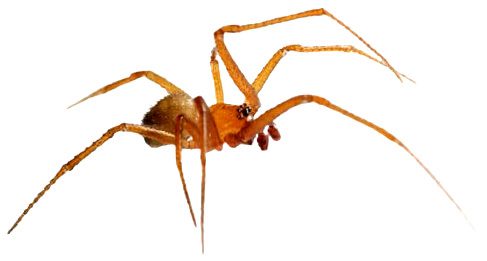
Recognised as the world’s deadliest spider, this Australia spider is black and grows up to five centimetres long. Funnel-web spiders have a glossy, lightly-haired body. Their bite is deadly for both humans and animals, killing within an hour. The tinier the spider, the more venomous it is.
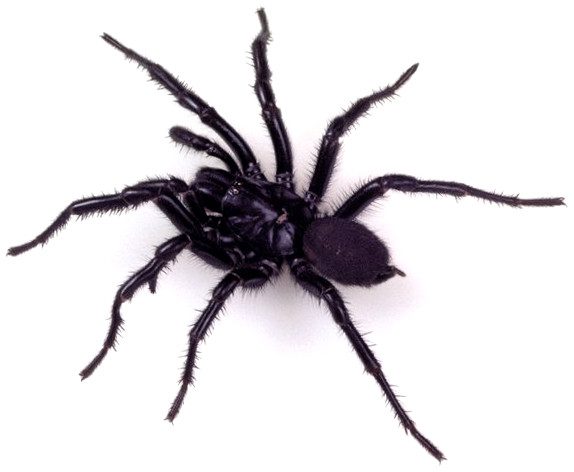
A redback spider is one of the small house spiders you can quickly identify by its round abdomen featuring a red dorsal stripe. The spider has a neurotoxic venom that causes burning pain. Other symptoms of the bite include sweating, vomiting, and muscle rigidity.
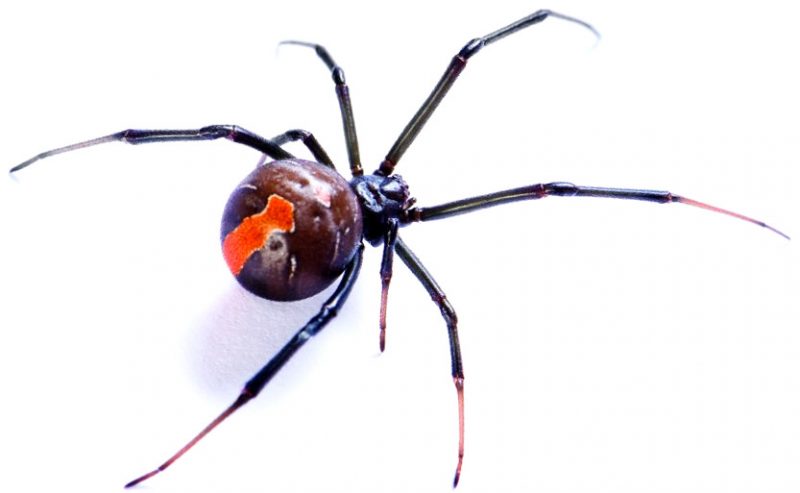
Daddy longlegs are 7 to 9 mm in length and have very long legs, forming their name. When females lay eggs, they may hold them on the palp until they hatch. The palp is a pair of appendages located near the mouth of a spider and looks like short, leg-like structures. These spiders usually make webs in the house, shed, or garage. They feed on insects and even other spiders. Their bite is toxic. Therefore, seek immediate medical attention if you get bitten.
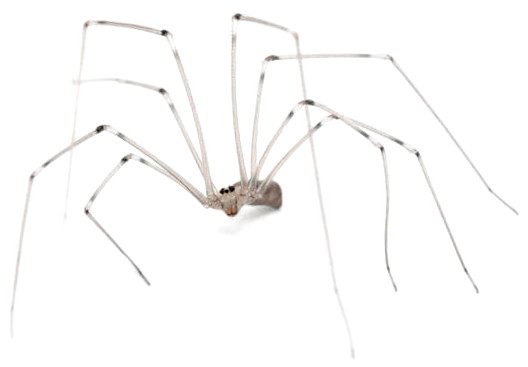
If you allow the types of house spiders mentioned above to invade your home, you increase the risk of bites that can be fatal. You keep spiders out of your house by depriving them of all the things that attract them inside. So, sweep and vacuum the attic and basement regularly and pay attention to window sills, wall corners, and ceilings. Another way to prevent them from coming indoors is ensuring that you seal cracks in the walls, floorboards, and foundation. Alternatively, invest in a dehumidifier because most spiders love to live in humid environments and are drawn to moisture-rich places.
Maintaining your lawn is an effective measure towards spider control too. Do this by trimming down bushes, hedges, and branches leaning against the wall cladding. And ensure no foliage touches your house. It is also advisable to repair all rotting and damaged decking or siding. In essence, your indoor and outdoor spaces should be free of debris where poisonous household spiders thrive.
Whether harmless or harmful spiders infest your home, you need to get rid of these critters for good. Eliminating spiders may prove challenging due to their poisonous nature and the fear they instil. That is why it is recommended to work with a professional pest management service for safe spider removal. Professionals have years of experience dealing with different types of spiders – be it a big black spider in your house or a giant house spider that is poisonous. They use proven products and practices to eradicate spiders in homes once and for all. For effective and hassle-free spider control, make sure you hire a pest controller in your locality that is reliable and reputable.
September 27, 2022
Pest are on the move in the Adelaide Eastern suburbs, here is some info on pest in Norwood, Magill, Fullarton…
Read MoreAugust 30, 2022
Pigeons nesting under solar panels? Pigeons nesting under solar panels can wreak havoc, pigeons and other birds seek shelter between…
Read MoreOctober 26, 2021
Have you heard any strange noises coming from the roof? Or noticed any rat dropping on the floor? This may…
Read MoreWe understand that dealing with pests can be stressful. That's why we offer a convenient and speedy service. You can book our services online or get expert advice and bookings at 139 007. We offer appointments from 6am - 6pm and promise a 15-minute call back if you enquire online. We also provide digital service reports with photo evidence and offer credit card payment options in all service vehicles.